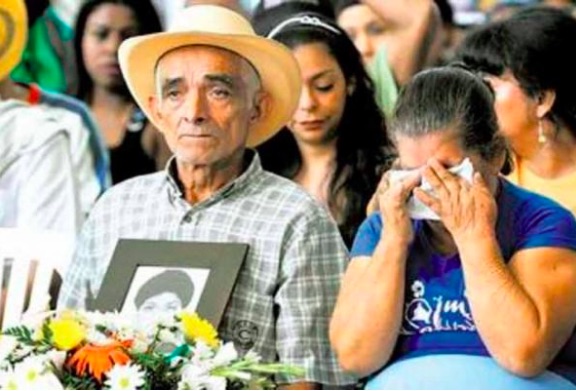… . HUMAN RIGHTS … .
An article from El Espectador (translation by CPNN)
The Truth Commission, which was born out of the peace agreement between the Colombian government and the FARC guerrillas, begins its mandate this Thursday [November 29] to clarify what happened during half a century of armed conflict.

With a symbolic ceremony, held in Corferias de Bogotá, this Thursday will begin on the day zero of this extrajudicial entity, which, for three years, will be challenged to hear, understand and interpret the voices of the actors of the armed conflict.
Its mission: to build a final report that establishes patterns of violence and facts of victimization. In the words of Father Francisco de Roux, president of the Truth Commission, from this day we are on a path that seeks reconciliation and that we will not repeat what happened.
“We hope we can contribute to Colombia seeking the truth in a sincere, transparent way, which is a public good and is the responsibility of all of us in Colombia. We hope to contribute in depth with our communication and pedagogy and with the Casas de la Verdad that we are starting to open in different regions in the form of a mobile team with the communities,” he said in an interview with the Justice for Peace chapter of Colombia2020 .
They will be eleven commissioners of the truth – accompanied by an interdisciplinary team – who will go to nine regions of the country and through mobile groups will collect testimonies from all sectors that will voluntarily provide information on the most serious facts of the conflict.
(Article continued in right column)
(Click here for the original Spanish version of this article.)
Question related to this article:
Truth Commissions, Do they improve human rights?
What is happening in Colombia, Is peace possible?
(Article continued from left column)
“This division of the country, and the location of the 26 houses of truth, are the product of the six months of work carried out by the Commission. During this time they also defined patterns of victimization that they intend to study, for example, torture, forced displacement, sexual violence, etc.,” said Truth Commissioner Saul Franco.
In addition to victim organizations, other organizations have approached the Commission, including members of the Military Forces, members of the former FARC and paramilitaries. However, as De Roux acknowledged, the political sector has not approached them. Former President Ernesto Samper – he revealed – has been one of the few who has expressed his intention to give his testimony before the Truth Commission.
It should be remembered that the truth commission is an extrajudicial entity that will not make judgments or assign individual responsibilities. “We must be aware that testifying to the Commission has an advantage: we are not judges, we are not going to punish anyone. We will protect the testimonies we receive. We have to use them to interpret what happened, unless the person who brings it says: ‘I want to give this testimony in public, because I want to contribute in a public impact to the transformation of the country.’ “, said Roux.
For Juan Carlos Ospina, coordinator of Advocacy of the Colombian Commission of Jurists, the challenges of the commission can be summarized in three points: first, organize its work to address the knowledge of the armed conflict, which is very extensive and complex, in just three years ; second, to allow the widest participation of victims and citizens, and to manage expectations adequately (with publicity and transparency) about their work. Third, build trust from the beginning. Listen to all the actors in the conflict and generate conditions for the construction of a culture of peace (respect, coexistence, reconciliation, co-responsibility and non-repetition) based on their work. Fourth, carry out its work (keeping in mind its complexity) not to judge wherever possible in view of the adverse scenario for peace created by the change of government and congress.
Finally, another of the Commission’s challenges is to face the resistances of the sectors that question their positions and their suitability. The wide variety of voices and the inclusiveness of the story, as the commissioners affirm, will be decisive for their legitimacy.